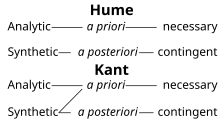
Hume's fork, in epistemology, is a tenet elaborating upon British empiricist philosopher David Hume's emphatic, 1730s division between "relations of ideas" and "matters of fact."[1][2] (Alternatively, Hume's fork may refer to what is otherwise termed Hume's law, a tenet of ethics.)[3] As phrased in Immanuel Kant's 1780s characterization of Hume's thesis, and furthered in the 1930s by the logical empiricists, Hume's fork asserts that all statements are exclusively either "analytic a priori" or "synthetic a posteriori," which, respectively, are universally true by mere definition or, however apparently probable, are unknowable without exact experience.[2][4]
By Hume's fork, a statement's meaning either is analytic or is synthetic, the statement's truth—its agreement with the real world—either is necessary or is contingent, and the statement's purported knowledge either is a priori or is a posteriori.[1][4] An analytic statement is true via its terms' meanings alone, hence true by definition, like Bachelors are unmarried, whereas a synthetic statement, concerning external states of affairs, may be false, like Bachelors age badly.[5] By mere logical validity, the necessary is true in all possible worlds, whereas the contingent hinges on the world's state, a metaphysical basis.[5][6] And the a priori is knowable without, whereas the a posteriori is knowable only upon, experience in the area of interest.[5]
By Hume's fork, sheer conceptual derivations (ostensibly, logic and mathematics), being analytic, are necessary and a priori, whereas assertions of "real existence" and traits, being synthetic, are contingent and a posteriori.[1][4] Hume's own, simpler,[4] distinction concerned the problem of induction—that no amount of examination of cases will logically entail the conformity of unexamined cases[7]—and supported Hume's aim to position humanism on par with empirical science while combatting allegedly rampant "sophistry and illusion" by philosophers and religionists.[1][8] Being a transcendental idealist, Kant asserted both the hope of a true metaphysics, and a literal view of Newton's law of universal gravitation by defying Hume's fork to declare the "synthetic a priori." In the 1930s, the logical empiricists staked Hume's fork.[9] Yet in the 1950s, W. V. O Quine undermined its analytic/synthetic distinction.[9] And in the 1970s, Saul Kripke established the necessary a posteriori. Still, Hume's fork is a useful starting point to anchor philosophical scrutiny.
- ^ a b c d Antony Flew, A Dictionary of Philosophy, rev 2nd edn (New York: St Martin's Press, 1984), p. 156.
- ^ a b Georges Dicker, ch. 2 "Hume's theory of knowledge (I): 'Hume's fork' ", Hume's Epistemology and Metaphysics: An Introduction (London & New York: Routledge, 1998), p. 41 introducing Kant's formulation of Hume's fork.
- ^ Nicholas Bunnin & Jiyuan Yu, "Hume's fork", The Blackwell Dictionary of Western Philosophy (Malden, MA: Blackwell Publishing, 2004), p 314.
- ^ a b c d Georges Dicker, "Hume's fork revisited", History of Philosophy Quarterly, 1991 Oct;8(4):327–342.
- ^ a b c Georges Rey, "The analytic/synthetic distinction", in Edward N. Zalta, ed., Stanford Encyclopedia of Philosophy (Fall 2018).
- ^ Peter van Inwagen & Meghan Sullivan, "Metaphysics", § 3.1 "The problem of metaphysics: The 'new' metaphysics; Modality", in Edward N. Zalta, ed., Stanford Encyclopedia of Philosophy (Spring 2020).
- ^ Leah Henderson, "The problem of induction", sec. 2 "Hume on induction", in Edward N. Zalta, ed., Stanford Encyclopedia of Philosophy (Spring 2020).
- ^ M. A. Box, The Suasive Art of David Hume (Princeton, NJ: Princeton University Press, 1990), pp. 39–41.
- ^ a b James Fetzer, "Carl Hempel", in Edward N. Zalta, ed., The Stanford Encyclopedia of Philosophy (Spring 2013).
